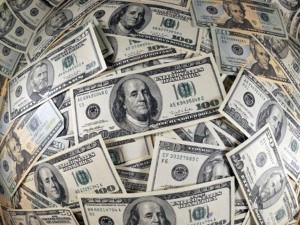US credit downgrade heightens global fears

FIRST TO REACT. A night view of the Gate building is seen at the Dubai International Financial Center, DIFC, in Dubai, United Arab Emirates, Sunday Aug. 7, 2011. Stocks tumbled across the Middle East on Sunday as most regional markets reopened following the historic downgrade of the United States' credit rating. The region's markets mostly operate Sunday to Thursday. That meant they were the first to react to credit rating agency Standard & Poor's decision late Friday to cut the U.S. level one notch to AA+ from its top AAA rating. (AP Photo/Kamran Jebreili)
TOKYO—Financial ministers from the Group of Seven (G-7) economies are planning urgent talks on world market stability as Middle Eastern markets tumbled on Sunday in the first sign of investor fallout from a historic US credit downgrade.
Deputy finance ministers on Sunday agreed on a conference call among higher-level ministers, which is likely to be held before Asian markets open on Monday morning, according to Kyodo News agency.
After a week that saw $2.5 trillion wiped off global stocks, the G-7 countries are concerned the downgrade of the US credit rating late Friday by Standard and Poor’s (S&P) would further rattle consumer and business confidence and financial markets.
The leaders from the United States, Britain, Canada, France, Germany, Italy and Japan are also expected to discuss the eurozone sovereign debt concerns.
Many economists see the world’s big central banks as the last line of defense at this moment in the crisis, after policymakers in Europe and the United States have failed to agree on the kind of shock-and-awe moves that many investors demand.
Article continues after this advertisementIn the eurozone, the summer recess of national parliaments is delaying the implementation of crucial changes to the currency union’s bailout fund that could help save Italy and Spain from expensive bailouts.
Article continues after this advertisementMany investors have also been calling on the US Federal Reserve to start pumping money into the American economy again to help underpin the slowing economic recovery.
Both Italian Premier Silvio Berlusconi and EU Monetary Affairs Commissioner Olli Rehn on Friday called for coordination among the G-7 countries, saying the crisis has to be tackled on a global level.
In the United States, the S&P credit rating agency on Friday said it would strip the United States of its sterling AAA credit rating for the first time and move it down one notch, to AA+.
Further losses
“Our initial sense is that the S&P decision will do nothing to calm jangled nerves at the beginning of the week,” Russell Jones, of Australia’s Westpac Institutional Bank, wrote in a report on Sunday. “Treasury yields are initially likely to move higher, perhaps sharply so, and risk assets will also suffer further losses.”
Still, Jones added that Treasury weakness was unlikely to last long for various factors, including that the United States still retains its top credit rating with Moody’s Investors Service and Fitch Ratings.
Some economists say the real danger won’t be higher interest rates but that the downgrade will reinforce doubts in the American economy and its leaders.
Stocks tumbled across the Middle East on Sunday as most regional markets opened for their first day of business following the downgrade of the US credit rating.
Mideast markets, except for Saudi Arabia, operate from Sunday to Thursday. The main Saudi stock index plunged 5.5 percent when it opened on Saturday, but it edged slightly higher on Sunday.
Stocks plunge
The Dubai Financial Market’s benchmark index plunged more than 5 percent in early trading before trimming its losses. The index was down 3.8 percent by early afternoon.
Egypt’s benchmark EGX30 index fell over 4 percent by midday, bringing its year-to-date losses to more than 32 percent.
Other Gulf markets also opened sharply lower. The Abu Dhabi index slumped 2.5 percent, while Qatar’s market shed 3 percent.
Farouk Miah, an analyst at NCB Capital in the Saudi capital Riyadh, said Mideast traders were concerned that debt problems in the United States and Europe could drag on oil-dependent economies in the region.
Miah expects Mideast markets to slump further if other global markets tumble on the US debt downgrade.
In Israel, the Tel Aviv Stock Exchange delayed the start of the week’s first session after premarket trade showed the benchmark index dropping more than 6 percent because of concerns over the US debt rating cut.
The main Tel Aviv index plunged 5.7 percent amid heavy trading by late morning.
Nervous markets
S&P’s decision to downgrade America’s credit rating echoed the nervousness of global markets in recent weeks, driven down by the relentless beat of grim economic news and a loss of confidence in the ability of political leaders to navigate challenges.
Governments on both sides of the Atlantic have avoided grappling with fundamental problems, counting on renewed growth to help borrowers who cannot afford to pay and creditors who cannot afford to walk away.
But four years into this age of financial contagion, the global economy cannot seem to pick up steam. Every promising leap seems to end with a sickening thud.
The easy answers are exhausted, and political leaders face a rising tide of anger that is constraining their ability to make more difficult choices.
Losing hope
S&P on Friday said that it was losing faith in America’s political leaders. After all, the movements of markets are collective predictions of future prosperity, and the continuing sell-off of riskier assets suggests that investors, too, are losing hope.
“Europe’s plan was to have growth fix the problem. America’s plan was to have growth fix the problem. And that’s not going to work,” said Kenneth Rogoff, an economics professor at Harvard. “I think it’s really starting to sink in that we’re not anywhere near an endgame.”
The United States and Europe face parallel debt problems. In America, banks and investors are pitted against homeowners. In Europe, banks and investors are pitted against nations. In both cases, governments have struggled to rebalance their books.
No surplus strength
There is no surplus of economic strength to throw at the problem.
The United States and Europe have ran up great debts in the years of plenty, living well and promising to pay later, even as they made expansive promises to aging populations.
“The restorative forces of the economy are very weak and the immediate forces that will be in place are worsening the problem,” said Joseph E. Stiglitz, an economist at Columbia University.
“We already know it’s not going to be a V-shaped recovery. I had said in my book that it would be more of an L-shaped, slow recovery. I think the answer now is a Japan-style malaise,” Stiglitz added.
Lack of jobs
The weakness of the US economy is most evident in the lack of jobs. Only 55 percent of working-age adults held full-time jobs in July, the lowest level in modern times.
Some 25 million US adults want but cannot find full-time work, the government said on Friday. The unemployment rate fell slightly, but mostly because 193,000 people stopped searching for jobs.
Consumer spending makes up 70 percent of US economic activity, and people without jobs spend less money. For more than a year, the government has reported that the economy was expanding more quickly than employment, fueling hope that hiring would follow.
Household wealth
But last week the government said in a new estimate that it was mistaken and that the economy actually had expanded at an annual rate of only 0.8 percent during the first half of the year—about the rate of population growth.
Falling home prices also shadow the recovery. Total household wealth remains 12 percent below its prerecession peak, according to the Federal Reserve.
Consumer spending has not suffered a comparable decline, suggesting that people still see brighter days ahead. If they are wrong or if they lose faith, economists say, spending could dip even more sharply—and with it, the broader economy.
Corporate profits have climbed to record heights, but companies are not hiring. Long-term prosperity depends on investment in research and equipment and workers.
But short-term fears are driving a turn toward austerity, said Gary P. Pisano, a professor at Harvard Business School.
“The dynamic that our government has gotten trapped in, companies are trapped in as well,” Pisano said.
Stock prices
Stiglitz said that falling stock prices could exacerbate the problem.
“Firms with stock prices in decline will be reinvigorated to cut costs,” he said. “And what does that mean? Lowering wages and firing people and making people work harder.”
Financial markets have also been slow to recover. A lack of confidence in the reported health of financial institutions is visible in the price of their shares.
Bank of America closed on Friday at $8.17, implying that investors believe the company is worth about $83 billion. Bank of America estimated its own value at roughly $206 billion at the end of June.
No easy solutions
There are no easy solutions. Rogoff, who studies the aftermath of financial crises, has written that recoveries tend to take a very long time, particularly when downturns are as long and as deep as this one has been.
The only way to hasten the process, he said, is to force the transfer of wealth from creditors to debtors—to rebalance the books.
This could be done, Rogoff said, through a policy of tolerance for higher inflation, which would reduce the value of debts over time.
“People sometimes ask, ‘What is the checklist of things that have to happen for a recovery?’” he said. “I think there’s basically one thing on it—improving the balance sheets.”
Summers’ view
Lawrence H. Summers, President Barack Obama’s former chief economic adviser who has returned to his previous role as a professor at Harvard, said that exacting a toll from creditors could constrain future growth by discouraging future investments.
“No one is satisfied with the efforts to reduce foreclosures and support the housing market,” Summers said.
“The barrier to doing more has not been ideology or any solicitude for the financial sector, but concern about the adverse effects of inducing nonpayment by homeowners or reducing the flow of new mortgage credit,” he added.
Summers argued instead that the government should focus on tax cuts and directed spending to stimulate private spending and investment, policies for which there is little political appetite.
But even such measures, he said, have only a limited effect.
Ultimately, he said, crises are caused by too much confidence, too much borrowing and too much spending—and the irony is that they must be solved by more confidence, more borrowing and more spending. Reports from AP and New York Times News Service
